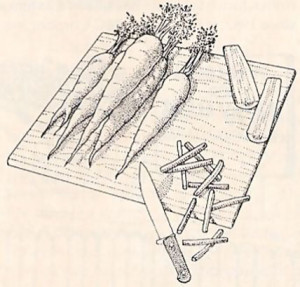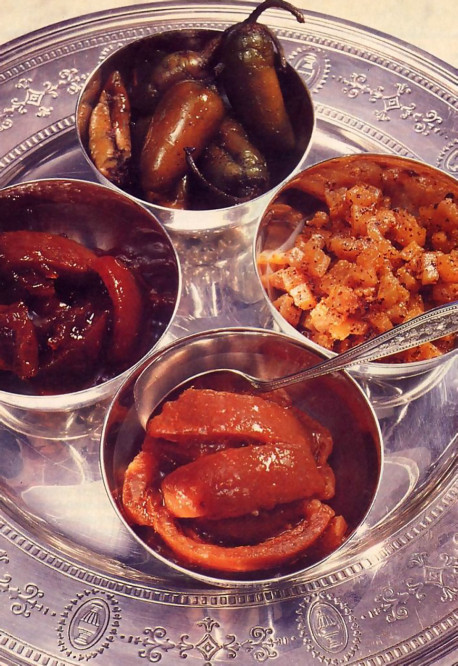Pickles to Relish
The wide array of pickled fruits and vegetables in Lord Krsna’s
cuisine confirms that variety is the spice of spiritual life.
by Visakha-devi dasi
For centuries, people throughout the world have known that extremely salty, acidic, or sweet foods don’t spoil. And for centuries people have employed various techniques to preserve, or pickle, their foods. While in the West brine or vinegar are the traditional pickling agents, in Lord Krsna’s cuisine we use sugar, oils, salt, spices, and sunshine.
The two most popular types of pickles in Lord Krsna’s cuisine are lemon and green mango, but virtually any fruit or vegetable that isn’t too soft makes tasty pickles—carrots, gooseberries, hot peppers, ginger root, radishes, even turnips. Whichever fruit or vegetable you prefer, get garden-fresh, high-quality selections, slightly underripe and without blemishes or soft spots. Lemons and limes should be fresh and young, with smooth skins and lots of juice.
As for the oil, mustard oil is traditional; it lends a distinctive pungency to the pickle. Peanut and sesame oils make milder-tasting pickles and are good for variety.
Srila Prabhupada was fond of pickles and often enjoyed them with his noon meal. And when he traveled he would have his servant bring a supply along. Yamuna-devi dasi (who was Srila Prabhupada’s cook for years) told me how Prabhupada spoke about pickles one hot summer morning in 1972. He was in Vrndavana, India, sitting on a veranda and observing four women who were quietly working. These women were visitors to Vrndavana, pilgrims, and Prabhupada watched as they set up a small makeshift kitchen to cook lunch for their families. “Do you know what aam achar is? he asked Yamuna. “It is mango pickle. When one is traveling, one can always take some puris [fried flat-breads] and achar.
“Formerly, when people used to travel by bullock cart, they would stop in a shady place, collect some wood and gobar [dried cow-dung patties], make a small fire, and cook a simple dal [dried-bean soup]. While the dal was cooking, they would mix some whole wheat flour, ghee [clarified butter], and water to make a soft dough. Then they would shape the dough into balls and place them on the embers to cook. Next, they flavored the dal with spices fried in ghee. And finally they took the cooked breads [called baatis] from the embers, dipped them into a small pot of warm ghee, and tossed them into the dal. This was their simple noon meal: puris, hot dal with baatis, and achar that they had brought from home. A meal so tasty that even the wealthiest people traveled to the countryside to relish it with the villagers.”
The pickles we’re presenting here have a sharp and exhilarating taste. They stimulate the appetite, enhance the flavors of the food they accompany, and introduce an amazing variety of taste into any meal. The flavors range from piquant to sweet to pungent. These pickles are appropriate for almost every kind of lunch or dinner, from the simplest to the most elaborate.
Lord Krsna also enjoyed eating pickles with His meals, as one of the great spiritual masters of the nineteenth century describes in a song about Krsna’s lunching pastimes in Vrndavana. The song names some forty or fifty kinds of dishes that the Lord and His friends delighted in, including “twelve kinds of sour preparations made with tamarinds, limes, lemons, and oranges. . . .”
Pickles enable us to relish some of the innumerable tastes that the Lord has provided. Srila Prabhupada writes, “Actually all tastes are within the earth, and as soon as seeds are sown in the ground, various trees sprout up to satisfy our different tastes. For instance, sugarcane provides its juices to satisfy our taste for sweetness, and oranges provide their juices to satisfy our taste for a mixture of the sour and sweet. Similarly, there are pineapples and other fruits. At the same time, there are chilies to satisfy our taste for pungency. Although the earth’s ground is the same, different tastes arise because of different kinds of seeds. As Lord Krsna says in the Bhagavad-gita, ‘I am the original seed of all existences.’
“Complete arrangements for the production of all the necessities of life are made by the Supreme Personality of Godhead. People should therefore learn how to satisfy Lord Krsna. Indeed, our prime business is to satisfy the Lord.”
This is the art of Krsna consciousness: taking what Krsna has provided and using it in His service. This art satisfies both the Lord and ourselves. And as our devotion and attachment to Krsna evolve, we will feel a pleasure and fulfillment in life unlike any we have ever known before.
(Recipes by Yamuna-devi dasi)
Plain Lemon or Lime Pickle
(Nimbu Achar )
4 smooth, thin-skinned lemons or limes
1 ½ tablespoons salt
1. Wash the lemons or limes in hot water and dry them.
2. Slice the lemons or limes, remove the seeds, and save any draining juice.
3. Mix the salt and the draining juice. Arrange the slices in a jar and pour the salt mixture over the top.
4. Seal with a tight-fitting lid and place in the hot sun, bringing the jar inside at night, for two weeks. Shake the jar daily. The slices will gradually shrink to nearly half their original size.
5. The pickle is ready to offer to Krsna when the skins are tender and a buff color. One- or two-year-old lemon pickle is a great delicacy.
Spicy Lemon or Lime Pickle
(Masala Nimbu Achar )
3 cups water
3 large, thin-skinned lemons or limes
1 teaspoon garam masala
1 ¼ tablespoon salt
1/3 cup brown sugar
½ teaspoon turmeric
1. Bring the water to a rolling boil in a small saucepan; then remove from the flame. Place the lemons or limes in the hot water and soak them for five minutes. Remove, cool slightly, and then dry each lemon or lime.
2. Slice each lemon or lime into 8 or 12 wedges; remove the seeds.
3. Combine the garam masala, turmeric, salt, and brown sugar. Pack the lemons or limes and spices in alternate layers until all of the ingredients are used. Cover with a tight-fitting lid and keep in the hot sun, bringing the jar inside at night, for at least a week before offering it to Krsna. Shake the jar daily. This pickle is good for at least a year.
Spicy Lemon or Lime Pickle in Oil
(Masala Nimbu Achar)
3 cups water
3 medium-sized, thin-skinned lemons or limes
3 tablespoons mustard or sesame oil
4 or 5 small, fresh hot green chilies, split in half
1 ½ teaspoons fennel seeds
1 teaspoon powdered black mustard seeds
¼ teaspoon chili powder
1 ¼ teaspoons garam masala
¼ teaspoon turmeric powder
1 tablespoon salt
1. Boil the water in a three-quart saucepan; then remove the pan from the flame. Place the lemons or limes in the hot water and soak them for five minutes. Remove, cool slightly, and dry each lemon or lime.
2. Cut each lemon or lime into 16 wedges; remove the seeds and collect the draining juice.
3. Heat 1 tablespoon of the oil in a small frying pan over a medium-low flame. Add the split green chilies, fennel seeds, mustard powder, chili powder, garam masala, turmeric, and salt. Fry for about 2 ½ minutes. Remove the pan from the flame and cool.
4. Combine the seasoning, lemons or limes, and the collected juice, and pack into a pint jar. Seal with a moisture-proof lid and set in the summer sun for at least seven days. Shake the jar each day and bring it inside at night. On the eighth day, pour in 2 more tablespoons of the oil and shake well. This pickle can then be offered to Krsna. It can be stored for several months.
Plain Green Chili Pickle
(Har Mirch Achar)
This is one of the hottest pickles and should be relished only by the connoisseur, as it may scald the untempered palate.
8 ounces small, hot green chilies (the mild Jalepeno chili is recommended)
½ tablespoon powdered ajwan seeds
1 tablespoon powdered mango
1 ½ tablespoons mustard or sesame oil
1 tablespoon salt
1. Wash and dry the chilies.
2. Heat the oil in a small saucepan. Add all of the ingredients and fry over a low flame until the chilies become slightly limp.
3. Remove from the flame and cool to room temperature. Pack into a pint jar and set in the hot sun, bringing the jar in at night, for at least five days. Then offer it to Krsna. This pickle will grow hotter with age.
Cauliflower Pickle
(Phoolgohi Achar )
3 cups water
8 ounces of ½-inch by 1 ½-inch cauliflower flowerettes
1 teaspoon black mustard seeds
½ teaspoon turmeric powder
1 teaspoon garam masala
1 ounce peeled, fresh ginger root, sliced thin
¼ teaspoon chili powder
½ teaspoon salt
1 ½ tablespoons mustard or sesame oil
1. Boil the water in a 3-quart saucepan. Toss in the flowerettes and parboil for about 2 minutes. Remove and drain in a colander.
2. Heat the oil in a small saucepan over a medium flame. Add all of the ingredients and stir-fry for 30 seconds.
3. Pack all the ingredients into a pint jar. Secure the lid tightly and then cool. Set the jar in the hot sun, bringing it in at night, for at least seven days before offering it to Krsna.
Carrot Pickle
(Gajar Achar )
 7 ounces fresh, sweet carrots
7 ounces fresh, sweet carrots
1 tablespoon black mustard seeds
½ teaspoon turmeric powder
1 teaspoon cumin seeds
¼ teaspoon fenugreek seeds
½ to 1 teaspoon powdered red chilies
¼ teaspoon clove powder
½ teaspoon salt
3 tablespoons mustard or sesame oil
¼ teaspoon cinnamon powder
1. Cut the carrots into thin strips and place them in a shallow bowl. Sprinkle 1 tablespoon of salt over them and marinate for 2 hours; wash and drain well.
2. Grind the mustard seeds, cumin seeds, and fenugreek seeds on a stone mortar or in an electric coffee mill. Add the remaining spices and salt, and blend well.
3. Heat the oil in a small saucepan over a medium flame. Remove from the flame, cool for fifteen seconds, and then toss in all of the spices and stir.
4. Pack the carrots in a pint jar. Pour in the spices, cover with a moisture-proof lid, and set in the hot sun for one week, bringing the jar inside at night. Then offer to Krsna.


Leave a Reply